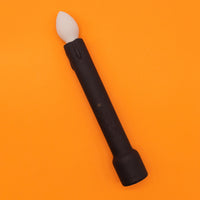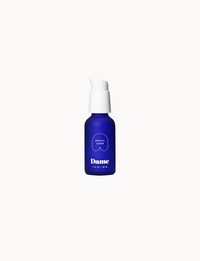Alexandra Fine, Credentialed Sexologist, M. Psych | Written by Dame
Problems you never could have envisioned when you were younger:
- Your partner is ready, but you’re not.
- You know it’s been a while, but you still don’t have the urge to jump into bed and do what comes naturally.
- Stress at home or at work has you thinking less about sex, and more about a pint of ice cream, a night of binge-watching, or a good night’s sleep.
Despite the way that sex is often portrayed in movies and on TV, there’s no shame in not being ready to get it on, any time, any place. We all have physical ups-and-downs and mood swings. In real life, everyone has times when they simply don’t feel sexy.
But sexual activity is a normal human desire, and a healthy sex life is crucial for long-term relationships.
So what do you do if you still find your partner(s) attractive, but regularly find yourself unable to get into the mood for sex?
Here’s what the experts suggest.
Give Yourself Time
If you work at home, you probably don’t run right from your bed to your computer without brushing your teeth and having your first cup of coffee. (No, checking email on your phone doesn’t count. We’re talking about productive work.) To put it another way, there’s a good reason why a gourmet meal starts with the appetizer, not the entree. You need the right mindset to fully engage in or enjoy a sensual activity like eating.
That applies to sex, too. Most people can’t finish washing the dishes or putting the kids to bed, and immediately switch to “sex mode.” They first have to get into the right, sexy mood.
For some, that means relaxing. Perhaps a warm bath, lighting a scented candle and reading in a comfortable chair, or enjoying a cup of tea (or sparking up a bowl) will do it for you.
For others, it could involve getting more in touch with their inner self and feelings. Meditation, mindfulness exercises, yoga and other types of self-care can provide comfort and security while relieving the stress that might be a roadblock to sexual arousal.
And some people need some “me time,” getting into the mood with their own private appetizer before the main course. That doesn’t necessarily mean masturbation; it could simply be fantasizing, reading romance novels or watching erotica.
Oh – and don’t forget go-to aphrodisiacs like wine, strawberries and chocolates. They may not help. But they can’t hurt!
Giving yourself time and space to switch from “life” mode to “sexytime” mode (as Borat would call it) might make all the difference.
Change Things Up
It doesn’t matter whether we’re discussing normal daily chores or a partnered sex life. It’s easy to fall into ruts.
Avoiding those ruts, with just a few simple changes, can often reinvigorate a sex life or allow you to rediscover a lost sex drive.
Change Things Up In the Bedroom
Some people simply rely on the same-old, same-old – not just in a long-term relationship, but even with new partners. After a while, it’s easy to associate “sex” with the same lingerie, the same positions, the same locations, even the same sexual menu (“two minutes of kissing and touching, five minutes of breast play and oral stimulation, six minutes of penetration”).
You could say that a routine like that is easy, comforting or satisfying. You could also say that it’s boring – and it is. Not because there’s anything wrong with a routine, but because the brain rewards new experiences.
One of the reasons that a new relationship can be so exciting is simply that it’s new. Recent studies have shown that, in simple terms, “novelty makes us happy.”
Research reveals that new experiences activate the pleasure center in the brain, causing the release of the “feel good” neurotransmitter dopamine. So the excitement and happiness you feel when going out with a new crush isn’t necessarily because they’re terrific – a lot of it is simply because they’re “new.”
That knowledge can be applied in the bedroom. Happiness isn’t the only thing that is triggered by a surge in dopamine; research has shown that the chemical is also linked to sexual arousal and motivation.
There’s an obvious conclusion: since new sexual experiences can elevate your mood and arousal level, they should certainly be able to help you get into the mood for sex.
That doesn’t necessarily mean you should run out and find a different partner (or bring them home for a threesome). Simple changes in your bedroom routine can cause that same release of dopamine. Some you can try:
- Raise the level of anticipation. Try leaving hot notes or sexting with each other ahead of time.
- Cuddling, physical contact and even hanging out causes the release of the “love hormone” oxytocin, which not only increases feelings of intimacy but boosts mood as well.
- If sex is normally reserved for the hour between TV and sleep, try a middle-of-the-night surprise (always with consent, of course), a morning quickie or some afternoon delight.
- If penetrative sex ordinarily means missionary and occasionally doggie-style, experiment with cowgirl, side-by-side, or sitting face-to-face. Or do an online search; you’ll be shocked at how many possibilities there are.
- If “sex” means “in the bed” in your relationship, here’s a news flash: all of your body parts function just fine elsewhere, too. That doesn’t have to mean recreating a movie scene in which one partner grabs the other and shoves them against the wall while penetrating them (although that certainly works for some people). The carpet, a chair, the living room couch, the shower; use your imagination and try something new. Your brain will enjoy it, as will you.
- If you don’t usually incorporate sex toys or vibrators into your sex play (or you only use them for masturbation), use them to liven up your sexual experiences. And if you use the same tried-and-true ones, try something new. Couple-friendly toys like the Eva wearable vibrator are designed to provide clitoral stimulation during penetrative sex, but they can get both partners excited.
- There are other ways to juice up a relationship. Playing sex games, reading erotic stories, enjoying sexy (or nasty) audiobooks or videos, some light bondage play (with consent) – they may not be for everyone, but they’re all new experiences to most couples, and all can raise the sexual temperature in the bedroom.
This last suggestion isn’t literally about changes “in the bedroom” – but that’s the point. When was the last time you had sex somewhere new and different with your partner, like a B&B in the country, or a hotel room downtown?
A change in scenery, where the house or apartment doesn’t provide constant reminders of everyday stresses and concerns, can work wonders. It doesn’t have to be a trip to New York or Hawaii, or even an overnight trip to a nearby motel, particularly in these days when COVID has put a damper on many people’s desire to travel. A “campout” in the backyard might be enough to get the juices flowing and let you focus more on sexual desire and satisfaction.
Change Things Up Outside the Bedroom
The surge in dopamine associated with new experiences doesn’t just occur during sex play in the bedroom. Enlivening the non-sexual parts of a relationship can still boost happiness, closeness and sexual arousal.
Does “going out to eat” usually mean getting your favorite dishes at your favorite restaurant, or grabbing a pizza down the street? Is “getting out of the house” usually a synonym for going to the supermarket, picking up the kids from a play date, or seeing a movie at the mall?
Make an effort to change things up there, too. Try a new and very different restaurant, go hiking or canoeing, visit a local farmers’ market or museum, try axe-throwing at a local bar or visit an escape room. If you and your partner are the type, checking out a sex shop or erotic show might jumpstart things.
What you do doesn’t really matter. And if time is a concern, the new activity doesn’t have to be an all-day excursion; many sex therapists and sexual wellness experts suggest simply scheduling a regular date night that doesn’t necessarily include sex. (But if things go well…….)
Altering your normal routines once in a while can let you escape situations that reinforce daily stress, while discovering new things about your partner – or rediscovering the things you loved about them in the first place.
There are several benefits to doing that. First, the new experiences will stimulate the flow of dopamine we’ve mentioned, boosting happiness and sexual arousal. Second, the stress relief may allow you to relax enough to put sex higher on your to-do list. Finally, the ability to interact with your partner outside of normal daily life provides the ability to renew your appreciation of the qualities that brought you together. That, in and of itself, may recharge your sexual desire.
Change Things Up In the Relationship
You can’t solve a problem until you realize that it is a problem.
If you regularly have difficulty getting into the mood for sex, take inventory of your relationship. Is there frustration, anger or dissatisfaction – for any reason, on the part of either partner – percolating under the surface? That could be the underlying reason for a lower interest in sex. Obviously, unresolved sexual problems or issues between partners could be to blame as well.
Sex educators agree that honest communication is the first step, and hard work to resolve any serious problems might have to follow. Conversations with a relationship counselor or sex therapist may also be necessary. But these types of issues can’t be ignored; they most certainly will affect your sex life, and in most cases, all aspects of your daily life.
One related note: frustration, anger or dissatisfaction with yourself can also interfere with your ability to get into the mood for sex. Sorting out issues like poor body image or low self-esteem, either by yourself or with the help of a mental health professional, may be the solution to a lack of sexual desire.
Is There A Physical or Psychological Problem?
Getting in the mood for sex isn’t always a matter of rekindling desire. Sometimes the causes are physical or psychological.
Pain During Sex
Painful sex can, needless to say, make you hesitant about engaging with a partner.
Pain during sexual activity could be caused by local and usually-temporary issues like rashes, irritation or infections; your doctor or local health care professional can help with those. The pain could also be due to a more serious problem like endometriosis, pelvic floor dysfunction, fibroid cysts or tumors, and even fibromyalgia and inflammatory bowel syndrome. It may be necessary to see a specialist who can treat the issue, which would hopefully ease the pain associated with sex.
Pain during sex is a particularly common issue for vulva-havers who are approaching, experiencing, or post-menopause. The resulting drop in estrogen levels often leads to reduced blood flow to the vagina and vaginal dryness – and importantly, lower estrogen levels often cause a lack of sexual desire. Lube may help with some of the pain, but a gynecologist or endocrinologist may be able to provide a more effective solution.
Health-Related Libido Issues
A number of health and lifestyle issues can cause a loss of sexual arousal or interest.
- High stress or anxiety levels can directly impact libido. One of the body’s responses to stress is the release of the anti-stress hormone cortisol, which also lowers sexual arousal and desire.
- Depression may be the underlying cause of sexual dysfunction – and concerns about sexual performance can negatively affect sex drive.
- Ironically, commonly-prescribed antidepressants may also impact sexual desire. SSRIs like Celexa, Paxil, Zoloft and Prozac are the worst offenders. Beta blockers and diuretics prescribed to treat high blood pressure may also affect sex drive.
- Smoking, excessive alcohol consumption or drug use, and obesity are common culprits as well. Not getting enough exercise and poor diet can also be factors. (The type of workout matters, too. Spending too much time on the exercise bike can put excess pressure on the artery that carries blood to the genital area.)
Your physical and sexual health are even more important than candles and meditation, new sex positions, date nights, or chocolate and strawberries, when you’re trying to get into the mood for sex. As long as your mind and body are ready for sexual activity, everything else can fall into place with a little work and some self-care.















































